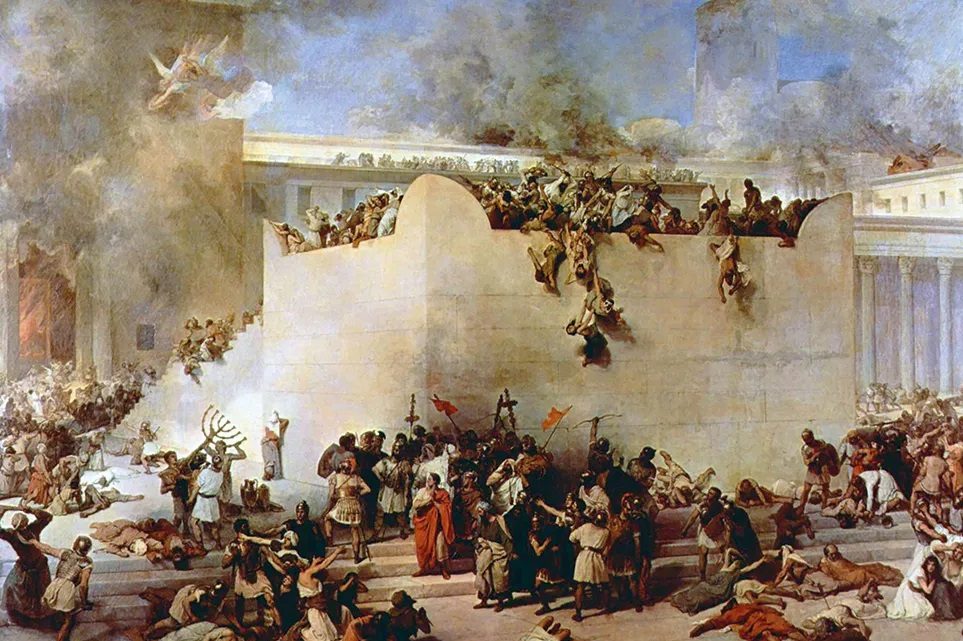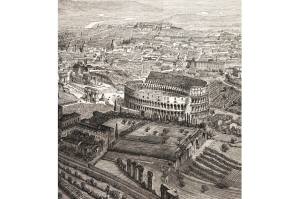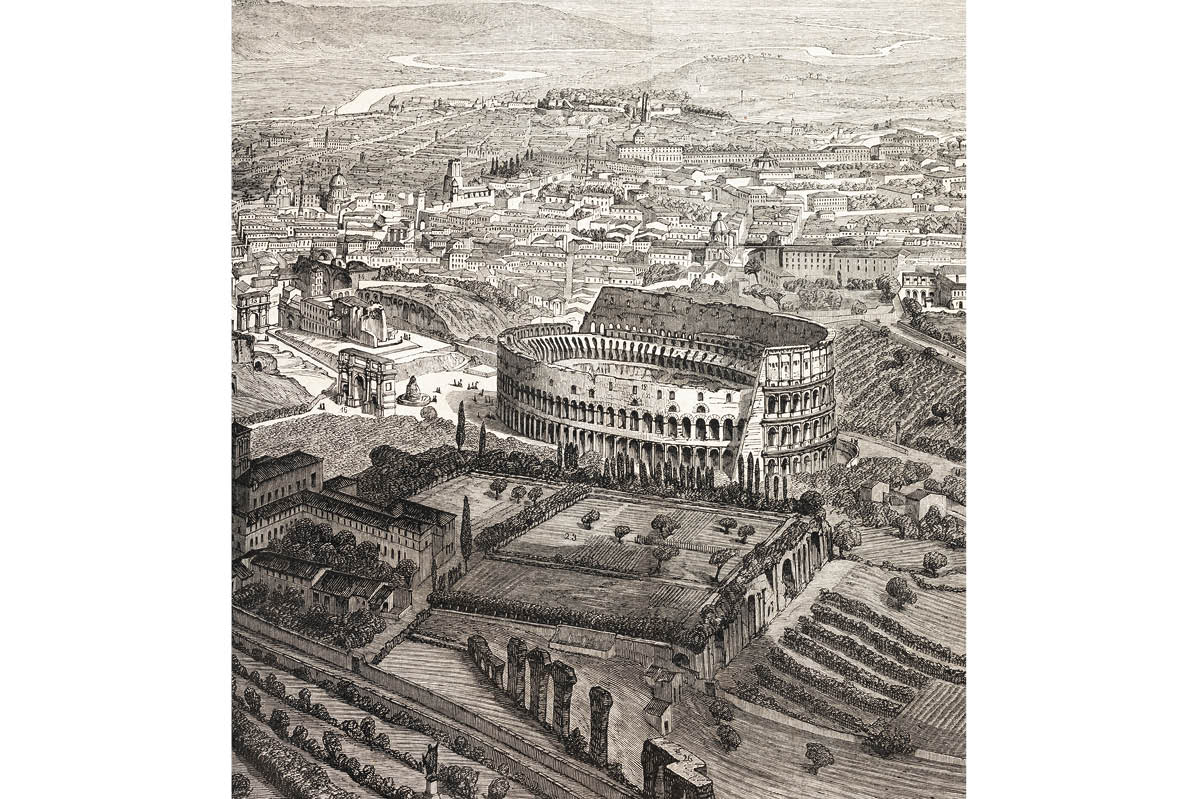The Roman emperor Domitian began life as a spare. At the end of the first century CE, while his brother Titus was the heir to their father Vespasian, the younger boy’s “sense of resentment and frustration had festered,” writes Tom Holland. “Rather than stay in Rome, where his lack of meaningful responsibility was inevitably felt as something raw,” Domitian moved away with a wife whom his family disliked, “doomed forever to be a supernumerary,” paranoid, attracting gossip, avoiding any company in which “innocent mention of baldness” might be viewed as “mockery of his own receding hairline.”
In most judgments by posterity this Prince Harry of the early empire fulfilled all this lack of early promise. Big brother Titus became emperor only briefly. So the spare got the top job after all, but became mostly famous for catching flies to stab with his pen, enforcing castration and holding death-themed dinners for nervous senators. Within this provocative history of Rome’s “golden age,” a series of varyingly connected episodes between the deaths of Nero and Hadrian, Holland gives back to Domitian some of his bruised reputation.
Let the sensitive beware: this book judges everything about Rome by the standards of the Romans themselves
Let the sensitive beware: this is a book that judges everything about Rome by the standards of the Romans themselves. The author is a master of immediacy — and not for him the fashion for deploring ancient virtues as modern vices. Providing peace, he argues, was the prime virtue for an emperor. But it was a particular kind of pax — the absence of wars in which Romans fought other Romans. Wars against other peoples were different. If the mass destruction or enslavement of Germans and Judaeans were necessary for Roman peace, so be it. For Holland, that is the key to understanding this time, which, as Edward Gibbon famously (and now notoriously) said, was part of “the period in the history of the world during which the condition of the human race was most happy and prosperous.”
Domitian learnt the importance of avoiding civil war from Rome’s first emperor, Augustus, who had won a series of such wars, as well as from both his father and his brother. Although his family had denied the younger boy any substantive responsibility, the spare had not for nothing spent his time at the center of the imperial court: “His understanding of how power operated at Rome was pitiless and without sentiment,” Holland says.
Vespasian had triumphed as the last of the “four emperors,” courtier warlords whose armies had slaughtered thousands of fellow Romans for every day of peace in 69 CE, the year when Pax begins. Titus was from the start at the heart of his father’s attempt at a different kind of supremacy. Vespasian did not wish to follow his three dead predecessors as a civil war victor. Between his victory over his final Roman rival and his triumphant entry into Rome came his elder son’s gruesome suppression of a revolt in Jerusalem, a vital act in persuading Romans that Vespasian and his family were the victors in a virtuous foreign war.
In his two years as emperor himself, Titus oversaw the opening of the Colosseum and the recovery of the towns around Vesuvius from the eruption of 79 CE, both events vividly described here. But it was this first assault on the temple of Jerusalem, wall by wall, room by room, that was forever his statement of what an emperor needed to do, keeping his armies proud, his rivals cowed and himself in power. “The sea of flame was nothing to the ocean of blood, nor the death squads of legions to the legions of the dead,” wrote the historian Josephus, one of the many Judaeans who saw that the values of Rome in the era of their peace were not to be withstood.
Domitian had been left out of the triumphal chariots when his father and brother celebrated their Judaean victory in 71 CE. He had to be content to ride on horseback while the wagons of temple gold were driven to the treasury, alongside 700 of “the tallest and most handsome” prisoners. Some of the gold would become coins with the motto Judea Capta, a message to internal rivals, rebels elsewhere and Domitian himself.
When Titus died childless in 81 CE, Domitian was the spare no more. There was no legal tradition of inheritance from father to natural son (none of the first Caesars had gained power that way), but Vespasian had the sons needed for a dynasty, and he was not beset by palace poisoners. Domitian had also studied well. He launched foreign wars in Scotland and Germany, maximized public revenues, and exercised the minutest control over expenditure. Roman government had for one hundred years become a bureaucracy within a single household and, despite Vespasian’s aim to distance himself from the last heirs of Julius Caesar, the levers of Nero’s court were still there to be pulled.
Domitian ordered a new portrait coin of himself, “lacking so much as a hint of baldness,” as Holland points out, with Germania Capta as the words to remind everyone that he too was expanding the territory subject to Rome. He made no attempt to disguise his absolute power. He believed in sound money. When his revenues fell short of his ambition and Scotland had to be abandoned, he did not debase the currency but widened what was not yet known as his “tax base.” He did deals with the bigger reluctant taxpayers and massacred the smaller, reporting to the senate that he had forbidden the Nasamonians of Africa to exist.
Holland dismisses the idea that this obsessive management by the sometime spare was a cloak for the depravities that interested him more, the personal depilation of his concubines, boys and girls, and the torture of insects. Domitian, he says, was “not a man given to duplicity.” When he ordered the checking of male circumcisions to search for Jewish tax-evaders, he did not hide the policy. What you saw was what you got: “His duty was not to the senate, but to the empire as a whole, nothing less than to keep the world at peace.” He never had a ghostwriter (and historians became his main problem), but he could not have put it better himself.
Titus’s assault on Jerusalem, wall by wall, room by room, was his statement of what an emperor needed to do
Domitian had the classic paranoid’s defense of elaborate security arrangements. “The only time that people will believe his report of a conspiracy,” he complained, “is if he ends up actually murdered.” And thus it turned out. In September 96 CE he was assassinated by some of his own courtiers, who thought that the violent paranoia was coming too close to home. Like Titus, he had no children.
His successor, a long-time servant to the former imperial family, conveniently declared his hatred of his dead friend, and the combination of closeness and distance was enough for a smooth succession. Only a bit more than a year later, Nerva died of a fever, also childless. The next emperor, Trajan, came from the army and had no need to burnish Domitian’s reputation, although, as Holland puts it, he “owed much to him.” It was becoming a general rule that the likelihood of a man being remembered as a good emperor depended most of all on whether his successor needed him to legitimize his power. No one in antiquity needed a “good emperor” Domitian.
Trajan’s hairstyle, “straight, short, a soldier’s cut,” showed how he wanted to seem. (Hair is something of a theme in Pax.) He hoped to keep rivals at bay with his own boasts of captured nations. He based himself in Syria for an attack on Parthia (experiencing a forerunner of the Turkish earthquake this year), conquering enough to claim Parthia Capta on his coins but not enough to hold it when threatened by massive new rebellions. While Trajan was dying without a natural heir in 117 CE, one of his generals, Hadrian, was suspiciously ready to succeed, ordering retrenchment, new limits to the empire that included his wall against the Scots, and new ways of preventing civil war. The last words in Pax are from a piece of ancient graffiti found in Jordan: “The Romans always win.” In this fascinating time, skillfully sparked into life, this was largely true. These were good years for the Romans.
This article was originally published in The Spectator’s UK magazine. Subscribe to the World edition here.


























Leave a Reply